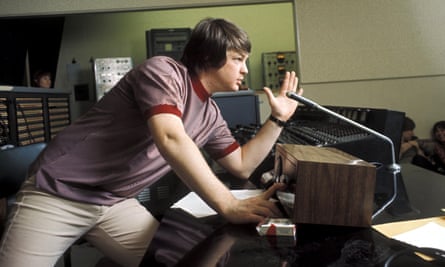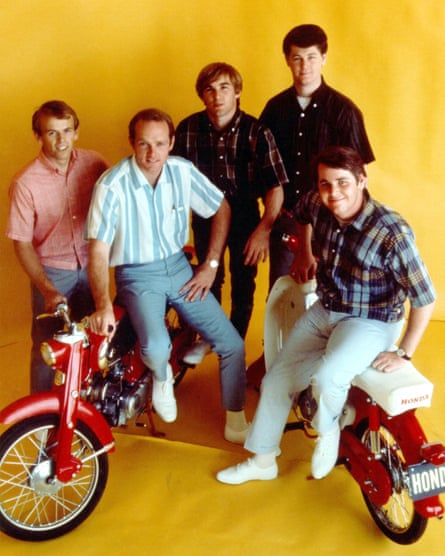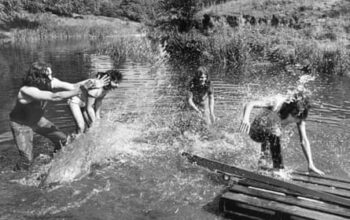Early on in this latest of Disney’s stream of blockbuster rock documentaries, there is a brief but telling moment. It is July 1976, the year of the US bicentennial, and the Beach Boys are taking the stage before a vast stadium of cheering fans in Anaheim, California. It is ostensibly a moment of triumph for “America’s band”, as the announcer calls them. Over the preceding couple of years, the Beach Boys’ long-waning commercial fortunes have been unexpectedly restored by a chart-topping compilation of their early hits called Endless Summer. Moreover, the band’s errant mastermind Brian Wilson has been reputedly restored to full fitness after years of drug abuse and mental health problems (“BRIAN IS BACK!” claims a promotional campaign that summer). “I like it, I like it,” crows frontman Mike Love, surveying the audience, as well he might. Then the camera catches Wilson, his face a mask of confusion and fear, an expression that suggests reports of his recovery were premature; he doesn’t appear to like it much at all.
The Beach Boys were seldom the band they gave the impression of being. Frank Marshall’s documentary is good on the disparity between the myth of gilded Californian youth that their music sold to the world and the people who made it. Singing about a sun-drenched utopia of beauty, confidence and endless material luxury in a succession of vintage television clips, they look awkward and nothing like the tanned, self-assured teenagers who populated their songs. But their harmonies, and the songs Brian Wilson conjured up in astonishing profusion, were so fantastic that their appearance scarcely mattered. Detroit-born producer Don Was is among those attesting to the alluring spell their music cast over teenagers in landlocked states.
It’s good, too, on how far the childhoods of Brian, Dennis and Carl Wilson diverged from the world they sang about. Their appalling father, Murray, was a mentally and physically abusive nightmare who terrorised his wife and children; in an old interview clip, Dennis and Carl glumly recollect the different-sized pieces of wood he kept to beat each of his sons with. Murray, ultimately, was a disaster as the band’s first manager. A thwarted songwriter himself, he was eventually fired for meddling in their music once too often, after which he sold their peerless song catalogue against their wishes, a decision that cost the band $100m in royalties. Incredibly, his depiction in the Beach Boys smacks of punches being pulled a little, tactfully skipping the more lurid stories; a particularly vicious childhood beating allegedly left Brian Wilson permanently deaf in one ear (one version of the story has Murray hitting his two-year-old son with an iron). An early 1990s court case also alleged he had forged his eldest son’s signature on the sale documents of his own songs.
The documentary does its best to make their success seem like a group effort, emphasising their harmonies and the fraternal bond between the Wilson brothers and their cousin Mike Love. (At one fantastic juncture, Love posits the theory that Brian Wilson’s mental problems would have been lessened had people realised that there was at least one other genius in the band, namely Mike Love.) Even so, there’s no doubt who the star of the show is. Because of Brian Wilson’s precarious mental state – subject to auditory hallucinations, he was eventually diagnosed with schizoaffective disorder – and the groundbreaking audacity of his writing and arrangements in the 60s, he is sometimes depicted as a kind of savant. It’s a line the documentary convincingly dispels. By all accounts, Wilson was not just talented but driven and competitive; “It wasn’t that great a record,” he sniffs of the Beatles’ I Want to Hold Your Hand. He was also a tough taskmaster: thrilling footage of him in the studio, barely out of his teens, shows him bossing LA’s most revered session musicians around in much the same way as he once forced his recalcitrant younger brothers to work on their harmony vocals.

But even his drive and competitive streak couldn’t handle the Beach Boys’ workload. Never a fan of playing live, he suffered the first of several nervous breakdowns on the road in 1964, a situation exacerbated by the fact that, as the band’s chief songwriter, arranger and producer, he had helmed nine albums in under three years. Relieved of touring duties, he made the greatest music of his life and, some suggest, the greatest music of the 60s; luscious, transportive and suffused with melancholy (even the euphoric Good Vibrations carries an odd, yearning undercurrent). But a cocktail of drugs, intra-band discord and the muted reception America gave his masterpiece, 1966’s Pet Sounds, rattled him. His mental health nosedived, he abandoned Pet Sounds’ follow-up Smile and the Beach Boys’ career went into apparently terminal decline.

The band were labelled hopelessly uncool by the tastemakers of the hippy era, although their interactions with the counterculture only served to make matters much worse. By 1968, Dennis Wilson was palling around with Charles Manson and introducing him to contacts in the music business, including his friend Terry Melcher, the man the Manson Family were looking for on the night of the Tate-LaBianca murders; he’d moved house, so they killed the new occupants instead. “It wasn’t Dennis’s fault,” says Al Jardine, plaintively, although Dennis thought it was. The Beach Boys soldiered on, Carl and Dennis stepping up to the songwriting plate, occasionally coaxing Brian from his bedroom to join recording sessions. They made some fantastic albums – 1970’s Sunflower, 1971’s Surf’s Up – to nugatory commercial impact. Then came Endless Summer and Brian’s supposed recovery.
At which point the documentary abruptly ends where it began, ignoring what happened next: another succession of flop albums (this time ones you can’t make much of a critical claim for); Brian’s second precipitous mental decline; the downward spiral of Dennis, which ended in his death in 1983. There’s no mention of the deeply troubling figure of psychologist Eugene Landy, who even his detractors believe saved Brian’s life, but whose method of treatment shaded into outright control of his life and artistry. After appointing himself Brian’s business manager, executive producer, songwriting partner and business adviser – and convincing him to revise his will to make him the chief beneficiary – Landy was eventually barred by court order from contacting Brian. No mention either of the succession of intra-band lawsuits that consumed the 1990s, or Brian’s 21st-century return as a solo artist – initially to great rejoicing, but later accompanied by accusations of exploitation.
Perhaps the last 48 years are omitted for reasons of space. The film would need to be twice as long to cover them, and the second half would feel more like a particularly lurid soap opera than a music documentary. But it seems more likely it’s out of a desire to append a happy ending on to a story that doesn’t really have one. In fact, the documentary does exactly that, assembling the band’s surviving members on the beach where the cover of their debut album was shot. They sit, apparently shooting the breeze, despite the fact that Mike Love has just told the viewer that relations between most of them remain strained following a critically acclaimed but turbulent 2012 reunion tour that ended in dispute and recriminations – as ever, not quite the band they give the impression of being.
Source: theguardian.com


